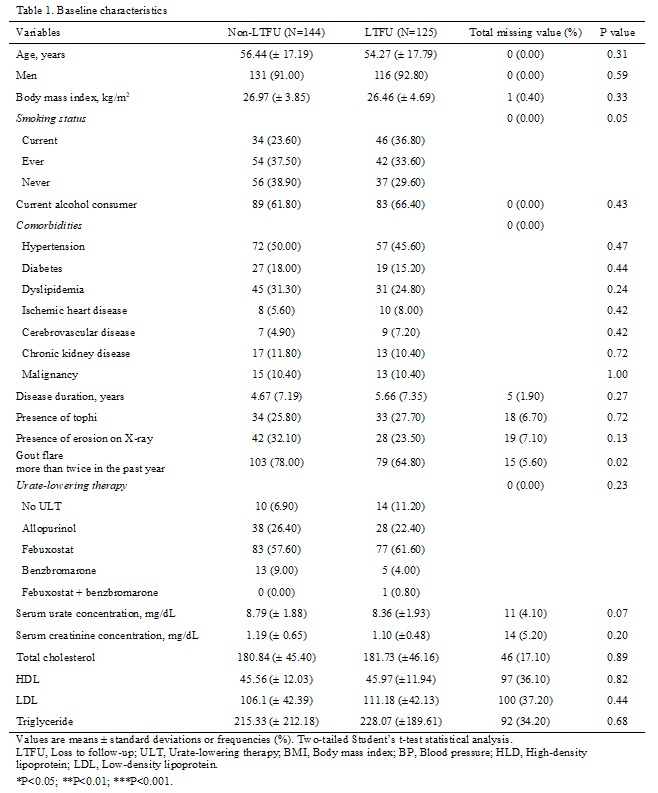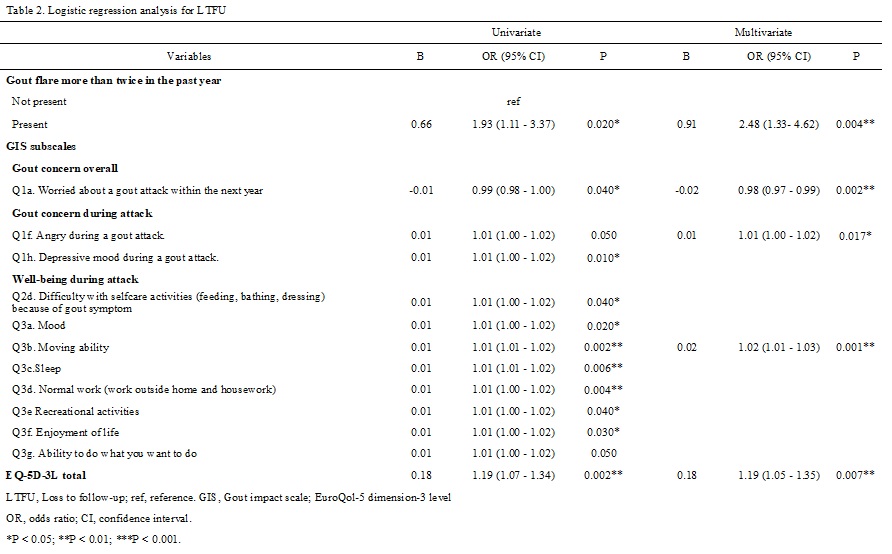Session Information
Date: Sunday, November 17, 2024
Title: Metabolic & Crystal Arthropathies – Basic & Clinical Science Poster II
Session Type: Poster Session B
Session Time: 10:30AM-12:30PM
Background/Purpose: Gout, a prevalent form of inflammatory arthritis, is generally considered to be easy to manage with urate lowering agent. However, many patients with gout still only take medication during gout attack, and persistent follow-up visits are not well conducted. This has led to the improper management and other complications of gouty arthritis. In this study, we aimed to identify the characteristics of individuals who are more likely to fail follow-up, and establish a proper management strategy for gout.
Methods: We utilized the data from the aftermath of Urate Lowering TheRApy in gout (ULTRA) registry, a prospective cohort of Korean patients with gout treated in multiple centers nationwide since September 2021. Subjects were 18 years or older and met the 2015 ACR/EULAR gout classification criteria. We collected the participants’ demographics, clinical data, comorbidities, lifestyle habits, medications, quality of life using the Gout impact scale (GIS) questionnaire, the EuroQol 5-Dimension (EQ-5D) scale score, laboratory results, and radiological results. Data was collected at baseline, at 6 months, at 1 year and then every year. Loss to follow up (LTFU) is defined as not visiting the outpatient clinic even once during the year after initial enrollment. afBaseline characteristic of both groups were compared, and logistic regression analysis for LTFU was conducted.
Results: Among total 269 patients, 125 patients belonged to LTFU group, and non-LTFU patients were 144. There was no difference between two groups (LTFU group 54.27±17.79 vs non-LTFU group 56.44±17.19, P= 0.31) (Table 1) The proportion of people who experienced gout attacks more than twice in the past year was 78% among non-LTFU patients and 64.8% among LTFU patients, showing a significant difference (P=0.02). There were differenced in GIS subscales between two groups. Non-LTFU patients were more worried about having a gout attack in the coming year (79.17 ± 21.52 vs 73 ± 25.91, P= 0.034). LTFU patients had higher degree of anxiety during attack (63.40±30.54 vs 56.25±28.74, P=0.049), depressive mood during attack (58.80±30.99 vs 49.13±29.03, P=0.009), affected moving ability (66.94±30.31 vs 55.11±29.73, P=0.002), and EQ-5D score (8.01±2.48 vs 7.11±2.03, P=0.002). In logistic regression analysis showed frequent gout flare in the past year, worry about gout attack, anxiety during gout attack, effected moving ability and EQ-5D were significant factors for LTFU (Table 2).
Conclusion: In this study, we identified that experiencing more gout attacks in the past year, along with increased feelings of depression, emotional changes, reduced quality of life, or difficulties in daily activities due to gout, were risk factors for LTFU. Therefore, we may be able to improve follow-up rates by providing appropriate emotional support and proper education to gout patients.
To cite this abstract in AMA style:
DO H, Kim M, Shin K, Moon K. Risk Factors Associated with Loss to Follow-up in a Prospective Gout Cohort [abstract]. Arthritis Rheumatol. 2024; 76 (suppl 9). https://acrabstracts.org/abstract/risk-factors-associated-with-loss-to-follow-up-in-a-prospective-gout-cohort/. Accessed .« Back to ACR Convergence 2024
ACR Meeting Abstracts - https://acrabstracts.org/abstract/risk-factors-associated-with-loss-to-follow-up-in-a-prospective-gout-cohort/


